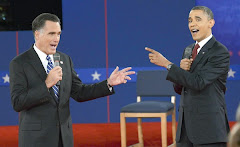Well, last week, your Speculatroners couldn't help but notice that the political media had apparently all had a brunch, or something, at which it was pretty much decided that the race for the White House was pretty much over. We could sort of understand why -- poll numbers were very rosy for Obama and the history of October comebacks in presidential politics is not exactly a rich one.
But we tried to warn everyone about the dangers of premature consensus. And we cautioned that one of history's near-comeback stories was John Kerry -- who used his first debate with former President George W. Bush as a springboard to get back into a race he was losing badly, and tighten the race beyond what anyone would have expected.
And now, here we are, seven days later. You know, here at the 2012 Speculatron, we don't try to be prophetic, but we're feeling pretty good about the way we called this week. We are at the very least, feeling better than the Obama campaign is right now -- saddled with the distinction of having badly whiffed at its first at-bat with Mitt Romney. The Romney campaign will now head into Sunday with a pair of victories under its belt -- one over its opponent, and one over its Republican critics. We'll get to the latter victory in a moment. First, let's dig in on the debate win.
The latter-day historical trend in presidential debates that feature an incumbent is that the challengers tend to win the opening outing -- the arguable exception being former President Bill Clinton, who went into his debates with a strong, simple message ("Let's build a bridge to the 21st century.") and a really bad debate opponent (Bob Dole, who tellingly went on to pitch Viagra on the TV). In our debate preview, we made note of one baked-in advantage that challengers have going for them: the "leveling effect." There's nothing that cuts through the abstractions of a political horse race like finally seeing the competitors, standing on the same stage as equals.
Wednesday night's debate was obviously not the zinger-fest we'd been promised. And it was remarkably free of attacks to the jugular. Instead, it was weedy, wonky, talky and dull. This was a letdown for anyone who came in, juiced on the montages of exciting debate moments from campaigns past that the cable networks were broadcasting. For Romney, however, wonky and boring was an ideal environment, as his major goal was just presenting himself, at long last, like a credible presidential candidate. That doesn't seem like a high hurdle. It's not. But it's the first hurdle, and if you're Romney -- walking into the room as the gaffe-prone plutocrat -- clearing it helps to put all those errors from the past three months in the rear-view mirror.
Ben Smith has gotten (rightly) taken to task for filing his take on the matter before the debate was half over, but his points about what Romney did nevertheless stand as an accurate assessment. Smith writes that Romney "needed to prove tonight that he could stand on stage with President Barack Obama as an equal and a plausible president of the United States," and that he accomplished that mission:
But Romney's core success was that he won by not losing: He has barely weathered a campaign that reduced him to a smaller figure than President Obama. On stage, they were roughly the same size.
What was Obama doing all this time? Well, inexplicably, he was helping Romney achieve an equal status, by offering Romney a leg-up and staging a pretty effective Obama-disappearing act.
Things started to go sideways for Obama in the early going of the debate, during a discussion that was supposed to be about jobs:
When it comes to our tax code, Governor Romney and I both agree that our corporate tax rate is too high, so I want to lower it, particularly for manufacturing, taking it down to 25 percent. But I also want to close those loopholes that are giving incentives for companies that are shipping jobs overseas. I want to provide tax breaks for companies that are investing here in the United States. On energy, Governor Romney and I, we both agree that we've got to boost American energy production, and oil and natural gas production are higher than they've been in years. But I also believe that we've got to look at the energy sources of the future, like wind and solar and biofuels, and make those investments.
The cardinal sin here? Obama's repetition of the phrase "Governor Romney and I both agree." The incumbent, in this setting, should never, ever accede to an agreement with the challenger. Especially when Politifact would rate "I agree with Mitt Romney" as "Mostly false." The simple fact of the matter is that Obama and Romney are not in agreement on tax reform or energy production, and the point of a debate is to shine a light on these differences. Obama may be a creature of conciliation, but there's no grand bargain to be wrought between he and Romney on policies -- this is an election.
All of this goes double, by the way, when your baseline strategy is to remind voters that your opponent refuses to discuss his plans in detail. If your best weapon is your opponent's lack of specificity, why lend him your specifics? The strategy of Team Obama Re-Elect, up to now, has been to cast Romney as someone who is hiding his true intentions. So it makes no sense to turn around, in your first face-to-face confrontation, and say, "I'll vouch for the guy."
But the most important flaw here is that from the get-go, Obama was helping to elevate Romney's stature, when he should have been demolishing it. The effect that the above passage has on undecided voters is it gets them thinking, "Hey, it turns out that this Romney guy isn't too far off from the policies of the Leader of the Free World. I'd like to hear him out, then."
A second, basic strategic through-line that anyone who knows anything about Mitt Romney, and his well-known propensity for both dissembling about his policy proposals and changing his positions when it suits him, uses is that you should probably be prepared to point out his dissembling and his position-switching. A day after the debate, Team Obama Re-Elect is pointing out, rightly, the vast array out lies that Romney told on the stage -- the most astonishing one being his claim that he has not proposed a $5 trillion tax cut.
But pointing it out the day after the debate is like complaining the replacement refs gave an unearned touchdown to the Seattle Seahawks -- sure, you're in the right, but when I open the newspaper and check the NFL standings, there's that Seahawks victory in the "win" column, staring back at me for all eternity. Obama needed to deconstruct those lies in real time on the debate stage, not wait for the league commissioner to weigh in 24 hours later. Jonathan Chait offers a theory as to why this proved so difficult:
Probably the best way to understand Obama’s listless performance is that he was prepared to debate the claims Romney has been making for the entire campaign, and Romney switched up and started making different and utterly bogus ones. Obama, perhaps, was not prepared for that, and he certainly didn’t think quickly enough on his feet to adjust to it.
But how was Obama not prepared for that? Being prepared for that specific tendency of Romney's is pretty much the first thing for which you need to be prepared! Look at it this way: Most of the time, if you come upon a skunk in the wild, the encounter is likely to pass without incident. But if you are unlucky enough to run up on a skunk in the wrong circumstances and it ends up spraying you with stink, you don't get to shout, "WTF, skunk! That was unexpected!" It's in the skunk's nature to spray you. And it's in Romney's nature to radically alter his position on issues when it suits his purposes.
Instead, the excuse being offered by Obama is that he ran into a Romney he never thought he'd ever meet. The late Sen. Ted Kennedy (D-Mass.), back in 1994, indelibly hung the nickname "Multiple-Choice Mitt" around Romney's neck. It's a real pity that Obama and Kennedy weren't close or anything, you know? At any rate, it largely fell to Obama's campaign subordinates to point out the fact that Romney had switched up on them during the debate. From Wednesday night to Thursday morning, all of this just further diminished Obama in the eyes of observers.
Finally, Obama closed the debate by -- again, inexplicably -- erasing himself and the last four years of his presidency: "Four years ago I said I'm not a perfect man and I'm not a perfect president, and that's probably a promise Governor Romney thinks I've kept. But I also promised I'd fight every single day for the American people ... I've kept that promise. And, if you vote for me, then I promise I'll fight just as hard the second term."
That first sentence is simply astounding. It's like Obama is saying, "Hey, Mitt, you forgot to zing me, but don't worry, I've got your back." From there, it's just self-effacement, trying to get over as a show of humility. Gosh, Obama says, I have tried my best.
Look, Joe Biden, who was actually the most watched person to take the stage at either convention, summed up the Obama presidency thusly: "General Motors is alive, and Osama bin Laden is dead." Biden is describing a man who has profoundly impacted the country -- a figure of bona fide world-historical importance.
But that guy didn't show up Wednesday night. Watching the debate, you'd have no idea that Obama was a consequential person at all. The auto industry may be alive, and our epic terrorist foe may be sleeping with the fishes (literally), but Obama may as well have been the guy from the human resources department, who processed all the TPS reports related to the General Motors-saving/Osama bin Laden-slaying projects. You don't send that guy to battle a real-live CEO.
OBAMA DEBATE INEPTITUDE, IN ONE EXCHANGE: The Obama campaign has made a big deal about Romney's "47 percent" remarks since the video of Romney characterizing half of America as hopeless, shiftless, "victims" at a donor party surfaced. Those remarks formed the backbone of one of its most brutal attack ads. So, why not drive the lane on the matter during the debate?
Jim Messina -- who is evidently some sort of "campaign manager" -- explained it thusly: "It just didn't come up in the course of the conversation. We continue to believe it is a very clear difference. Gov. Romney is trying to run away from that comment. It just didn't come up tonight."
What was the plan, then? Hope for Jim Lehrer to pose the question, "What about Romney's gaffes?" Everyone who bothered to check knew that the debate format was six, 15-minute segments on a broad domestic policy topic. What you are supposed to do with that is bend the conversation back around to the salient points you want to make about your opponent. One of the topics was a catch-all discussion on each candidate's opinion on the "role of government" in the lives of Americans. That would have probably been a good moment to point out that Romney said, "It's not my job to worry about those people."
ROMNEY BEATS THE GOP ESTABLISHMENT: Last week, we told readers that if they really wanted to find signs of Romney's imminent demise, they should dismiss the media consensus and instead study the actions taken by various conservative factions -- beginning first and foremost with those who control and direct large amounts of campaign money. The clearest sign that Romney is in trouble is if that money starts getting directed down ticket, in an attempt to preserve and obtain legislative majorities in the face of an imminent Obama win.
Going into Wednesday's debate, here's one of the news stories that greeted Romney,from Fox Business' Charlie Gasparino:
The Romney campaign is experiencing what some officials believe could be the beginning of a mass exodus of big money donors diverting their cash away from the Republican presidential hopeful and toward Republican candidates for the House and Senate races more likely to win in November, the FOX Business Network has learned.
The first benefit of Romney's debate victory is that he's going to forestall this, and keep those donors at home. The second benefit of Romney's debate victory? It's going to put the kibosh on all of the endless carping and armchair quarterbacking from conservative pundits and activists that had Ann Romney yawping, "Get in the ring." As Steve Kornacki put it:
All of this destructive chatter ceased Wednesday night, and the right is now re-energized, believing once again that the White House is winnable. We’ve seen something like this happen before: Remember the jubilant reaction of Democrats on September 30, 2004, when John Kerry – whom they’d all but given up for dead – turned in a command debate performance against a listless George W. Bush?
So, any lingering doubts? Perhaps. As Molly Ball noted, "The debate's most significant development was the unequivocal debut of a moderate, pragmatic Romney -- the Romney who governed Massachusetts and has rarely been seen since his 2007-era reinvention as an archconservative." And that's not sitting well with everyone on the right. Here's Philip Klein:
Another reason for caution is that Romney, as part of his efforts to disarm Obama’s criticisms, made a number of policy concessions that could box him in and make it more difficult for him to govern as a limited government conservative if elected. At various times during the debate Romney said that he wasn’t interested in cutting taxes, particularly on the wealthy; that he would cover individuals with pre-existing conditions; that he wouldn’t touch Medicare and Social Security over the next decade and would be willing to give more money to seniors for prescription drugs; and that he’d be open to hiring more teachers. Should he be elected president, all of the major fights –- repealing Obamacare, overhauling the tax code and reforming entitlements – will trigger a massive campaign by liberals to portray him as trying to hurt the poor to the benefit of the rich. If he is so willing to concede policy points during the campaign, will he fight for limited government as president?
Mike Riggs adds: "In other words, Romney “won” by promising big-government conservatism in the vein of George W. Bush. Actual conservatives should be furious and very worried."
Century Fox Reports: Mitt Romney: "I will create 12 Million Jobs."
Maybe so. But we think that actual conservatives mostly would just like to win the election. They have, for the most part, allowed Romney to operate without pinning him down on whether he plans to be the hand of transformative austerity or a closet-Keynesian.
THIS WAS NOT A ROMNEY LIE, BY THE WAY: Over at Rolling Stone, Tim Dickinson rounds up "Mitt Romney's Five Biggest Lies." We think he might have fallen one short, however:
"We've got 23 million people out of work or [who have] stopped looking for work in this country." Romney is lying for effect. The nation's crisis of joblessness is bad, but not 23 million bad. The official figure is 12.5 million unemployed. An additional 2.6 million Americans have stopped looking for jobs. How does Romney gin up his eye-popping 23 million figure? He counts more than 8 million wage earners who hold part-time jobs as also being "out of work."
Careful now. It's pretty glib to be able to say that those 8 million Americans who are holding down part-time jobs are not "out of work," but have you met any of those people? The simple fact of the matter is that lots of Americans are struggling to get by on part-time employment, and those who do show up in the U6 unemployment numbers as "underemployed" -- are people who want to be working full-time, but can only find part-time work. Part-timers, in addition, don't take home important benefits like employer-provided health care or paid sick leave.
Naturally, we've noted that as the U4 employment numbers started to get relatively rosier, critics of the Obama administration suddenly became super-interested in the U6 numbers. (That is, up until Friday, when they unleashed an embarrassing display of craze-faced conspiracy-mongering on the Bureau Of Labor Statistics latest jobs report.) You can bet your sweet bippy that if Romney wins election, all that renewed interest in the U6 numbers will fade, if we let it. But as long as they've brought it up, we should maintain an interest in it, because it tells the story of the fragile employment arrangements that many Americans are enduring.
So, go ahead and call Romney insincere or disingenuous in bringing this up, but don't call this a lie. It's not. It's all too real for millions of Americans struggling to get by on less.
ELECTORAL PROJECTION: It's time once again for your Speculatroners to end the week with our trademarked Electoral College projection, which is -- as always -- a mix of careful poll study, analysis of prevailing economic trends, pundit speculation, and a meeting in a Rosslyn, Va., parking garage with the guy who runs the "X-Files" section at the Bureau of Labor Statistics.
People like backing winners, and so we expect that Romney is going to get something of a bounce from his debate win. People also like economic recovery, and Friday's jobs report could blunt Romney's bounce in a material way. But we don't have the numbers in front of us to be certain how much the race will close. As First Read points out, none of us do: "They will be PLENTY of polls for everyone to see. But realistically, the first polls you should trust that will absorb the ENTIRE impact of the debate and post-debate are the runs released no sooner than Tuesday… You want surveys that were actually in the field Sunday and Monday."
But we obviously can't wait for Tuesday to make some kind of half-assed guess about the electoral college today, can we? So we'll generically assume that the race will tighten, and many of the battleground states -- Colorado, Virginia, Florida, and Nevada -- are going to be back or near-to-being-back in Romney's column some time next week. But Obama's firewall in Ohio remains intact. We sure hope Ohioans aren't yet sick to death of political advertising, because that is precisely what is going to consume their lives for the next month.
Edited By Cen Fox Post Team



































